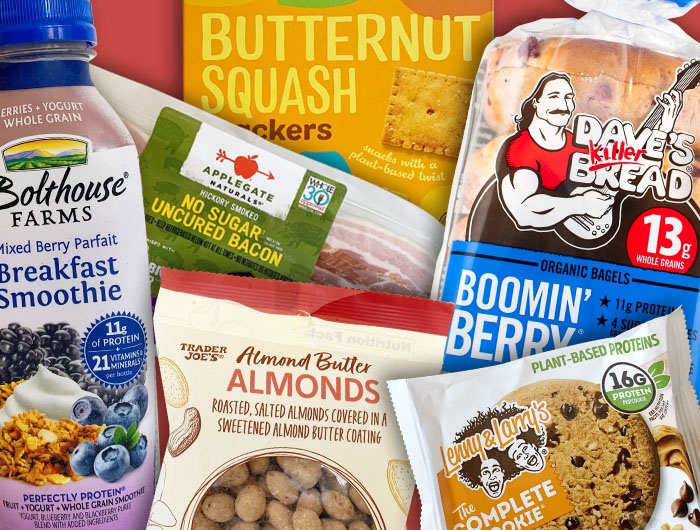6 healthy-sounding gimmicks to watch out for

Healthy foods sound simple: vegetables, fruits, nuts, whole grains, plant protein, no added sugar. But when companies use them as marketing ploys for processed foods, watch out.
1. “No sugar” sham

“Welcome to the sweet life—without sugar!” says Applegate Naturals No Sugar Uncured Bacon.
The catch: Ordinary bacon has, at most, 1 gram of added sugar per serving. Cutting that to zero might make a bacon “approved” for the trendy “Whole30” diet. But for anyone else, it’s a nothingburger.
Bacon’s real problem: “Uncured” or not, it’s a processed meat (like sausages, hot dogs, and cold cuts), so it’s linked to a higher risk of colorectal cancer. And that’s not so sweet.
2. The grams game

Dave’s Killer Bread Organic Boomin’ Berry Bagels are “ALWAYS power-packed with whole grains,” says the package, which trumpets the “13g whole grains” per bagel.
Don’t kid yourself. A Thomas’ 100% Whole Wheat Bagel has a whopping 48 grams of whole grains. And it’s no bigger! Why does Dave’s fall short? Its leading ingredient is “organic wheat flour,” not “organic whole wheat flour” (the second ingredient, which means there’s less of it).
And the not-exactly-a-boom of berries are sweetened, so you get 2 teaspoons of added sugar in each bagel.
3. Plant protein ploy

The 16 grams of protein in a Lenny & Larry’s Peanut Butter Chocolate Chip The Complete Cookie come from “plant-based proteins,” touts the label.
That’s mostly a “protein blend” of wheat, pea, and rice proteins, plus peanut butter and peanuts. Fine.
But the rest of each 440-calorie cookie is loaded with white flour, chocolate chips, processed fiber (inulin), added sugar (4 teaspoons), and palm oil.
When health experts recommend eating more plant proteins, they’re talking about foods like nutrient-rich beans, lentils, tofu, and tempeh, not oversized cookies spiked with protein.
4. Starch crackers

From the Ground Up leans on squash—the first ingredient—to sell its Sea Salt Butternut Squash Crackers. But then come whole-grain rice, cassava, and nutrient-poor potato starch, rice flour, potato flakes, and cassava starch. Sheesh.
Eating more veggies should mean actual veggies. Crackers, chips, or other snacks don’t cut it.
5. Not just nut butter

Trader Joe’s Almond Butter Almonds sound healthy. But the almond butter coating has more dry milk, added sugar (5 grams per serving), and palm and palm kernel oils than real almond butter. That explains how you wind up with 4 grams of saturated fat in every ounce instead of the 1 gram in plain almonds. Tip: If a coating stays solid at room temperature, it’s likely made with a saturated fat.
6. Smoothie moves

Does a Bolthouse Farms Mixed Berry Parfait Breakfast Smoothie come close to a parfait of berries, plain yogurt, and granola with intact whole grains? Nope.
Fruit? Instead of chewing on whole berries that fill you up, you’re slurping puréed. How much? The label doesn’t say. But most of the smoothie’s sugar is added (a hefty 7½ teaspoons); it doesn’t come from fruit. (Want “a delicious way to get more fruit in your diet”? How about just eating some?)
Whole grains? Bolthouse tosses in just 8-or-so grams of whole-grain rice plus oat flours.
Fiber? Neither the fruit nor grains are enough to supply the smoothie’s 14 grams. Turns out Bolthouse tosses in processed fiber from dextrin. Ditto for some of the “21 vitamins & minerals per bottle.”
Real food, anyone?
Need some irresistible vegetable recipes?

Booklet
Fall & Winter Vegetables
Starting at $8

Booklet
Spring & Summer Vegetables
Starting at $8

Book
Salad Days!
Starting at $16

